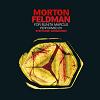 Written for one of the composer's former students, this solemn and fragile piece for piano is played beautifully by Stephane Ginsburgh. The constantly shifting music is like a kaleidoscope; chords change character and fragment into smaller, more discrete fractions before collapsing back into a solid chord again. My description may make it sound frantic but it is delicate beyond description.
Written for one of the composer's former students, this solemn and fragile piece for piano is played beautifully by Stephane Ginsburgh. The constantly shifting music is like a kaleidoscope; chords change character and fragment into smaller, more discrete fractions before collapsing back into a solid chord again. My description may make it sound frantic but it is delicate beyond description.
This bespoke piece was written towards the end of Feldman's life and its quiet, contemplative mood certainly feels autumnal. There is a sense of "What if?" about it; I imagine Feldman thinking about possibilities and might have beens as this piece unfolds. Each strike of the keys is a variant of previous motifs in the piece, like a musical multiverse being played out on a piano. The sustain pedal on the piano is kept firmly down during this piece and this prevents the piece from becoming totally silent between attacks, allowing these alternate universes to bleed into each other (and also adding wonderful dissonances to emerge beneath the surface of the music).
As the piece progresses, permutations and variations explore the different paths that the music could take. More often than not, the music is sombre but from time to time there are bursts of energy which stand out like fireworks in the dark. The subtle variations bring to mind the works of Erik Satie. For Bunita Marcus echoes Satie’s idea of furniture music; music that functions both as music and as audio wallpaper. As so much of Feldman’s piece is so similar, it is easy to switch off and then start paying attention again sometime later without feeling like much was missed. This is not to say that the music is ignorable but more that it blends in seamlessly with the environment.
Ginsburg';s interpretation of For Bunita Marcus follows Feldman's words quoted in the sleeve notes about not pushing the sounds about; the notes are allowed to flow under their own remit like water falling through a sieve. The recording sounds almost ghostly, almost as if there is no pianist at the stool and the piano is singing softly to itself. It is a remarkable recording that complements the rest of Sub Rosa's unfortunately out of print Feldman catalogue. Although it is always wonderful to get a new recording, it would be nice for the label to get around to reissuing some of those previous releases. Feldman often gets overlooked in favour of the more tempestuous stars of the 20th century avant garde which is a damn shame as For Bunita Marcus firmly demonstrates.
samples:
Read More

